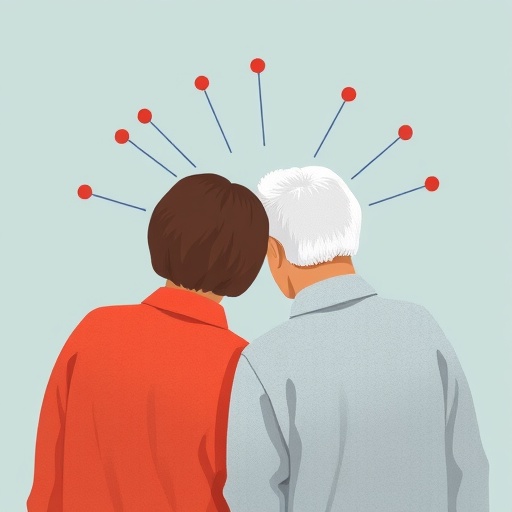In a recent correction published in BMC Psychiatry, researchers have revisited their study examining the intricate relationship between marital status and cognitive function among Chinese hypertensive patients. This cross-sectional analysis provides a nuanced perspective on how social and physiological factors intertwine, influencing brain health within a vulnerable population. The emerging data underscore the complex interplay between cardiovascular risk factors, psychosocial elements, and neurocognitive outcomes, opening new avenues for personalized interventions in cognitive decline prevention.
Hypertension, a well-recognized global public health challenge, not only compromises cardiovascular integrity but also poses significant risks for cognitive deterioration. Cognitive function encompasses various domains such as memory, executive function, attention, and processing speed, all critical for daily living and quality of life. The study’s focal point on marital status introduces an essential psychosocial variable, as social support and emotional well-being are increasingly acknowledged to modulate cognitive trajectories in hypertensive individuals.
Initial findings suggested that marital status could correlate strongly with cognitive outcomes, with married individuals demonstrating better performance on cognitive assessments than those who were single, divorced, or widowed. This association aligns with existing literature that posits marriage as a protective factor due to increased social interaction, emotional stability, and adherence to health-promoting behaviors. The corrected analysis reinforces these relationships by addressing previous methodological concerns, enhancing the reliability of these conclusions.
From a physiological standpoint, hypertension induces vascular alterations that impair cerebral blood flow and promote neuroinflammation. These pathological processes contribute to white matter lesions and microvascular damage, which are known substrates of cognitive impairment. The study’s cross-sectional design allowed researchers to analyze data from a large cohort of Chinese hypertensive patients, meticulously controlling for confounders such as age, gender, education, and comorbidities, providing robust statistical insight into the marital status-cognition link.
One of the critical technical aspects of this research involved neuropsychological assessments tailored for the Chinese population, ensuring cultural and linguistic appropriateness. Standardized cognitive function tests were administered, evaluating domains susceptible to hypertensive damage. The researchers applied multivariate regression models to dissect the independent effect of marital status, revealing compelling evidence that social bonds have a tangible impact on neurocognitive health beyond traditional vascular risk factors.
This study invites further inquiry into the mechanistic underpinnings of how social environments modulate neurobiological pathways in hypertensive individuals. It raises pertinent questions about the role of stress, emotional support, and lifestyle factors in either accelerating or mitigating cognitive decline. Importantly, the research advocates for interdisciplinary approaches combining cardiology, neurology, and social sciences to holistically manage patients at risk for dementia and other cognitive disorders.
Moreover, the corrected findings highlight potential clinical implications. Healthcare providers could consider marital status and related social determinants as part of comprehensive risk stratification models. Interventions fostering social engagement and addressing isolation might serve as adjunct therapies to pharmacological hypertension management, aiming to preserve cognitive function and delay neurodegenerative processes.
The geographical and demographic specificity of this work, focusing on Chinese hypertensive patients, adds valuable context to global data but also necessitates cautious extrapolation. Cultural factors influencing marital roles and social support dynamics may vary across populations, emphasizing the need for cross-cultural validation studies. Nevertheless, the insights gained here contribute meaningfully to a growing corpus of research emphasizing the psychosocial dimension of brain health.
In the era of precision medicine, identifying modifiable risk factors for cognitive decline remains a priority. This study’s intersectional approach, considering marital status alongside clinical variables, demonstrates a paradigm shift towards integrating lifestyle and psychosocial parameters in chronic disease management. The correction published not only rectifies analytical aspects but also strengthens the overall message—cognitive health is inherently multifactorial, shaped by an intricate balance of biological and social influences.
Future longitudinal research is warranted to explore causality and the temporal evolution of these associations. Long-term monitoring could unravel whether changes in marital status over time correspond to fluctuations in cognitive function, potentially informing targeted prevention strategies. Additionally, neuroimaging and biomarker studies might elucidate the structural and molecular correlates of social engagement in hypertensive brains.
As populations worldwide age and the burden of hypertension escalates, studies like this underscore the necessity of comprehensive health frameworks. By integrating cardiovascular care with mental health and social support systems, we can aspire to mitigate the impending surge in dementia cases. This research thereby holds implications not only for clinical practice but also for public health policies aimed at fostering cognitive resilience in vulnerable groups.
Ultimately, this correction and its reinforcing data propel the scientific dialogue forward, inviting clinicians, researchers, and policymakers to recognize the profound influence of marital status on cognitive outcomes among hypertensive individuals. It is a clarion call to embrace a biopsychosocial model in tackling the intertwined epidemics of cardiovascular disease and cognitive impairment.
Subject of Research: Association of marital status with cognitive function in Chinese hypertensive patients
Article Title: Correction: Association of marital status with cognitive function in Chinese hypertensive patients: a cross-sectional study
Article References:
Shen, S., Cheng, J., Li, J. et al. Correction: Association of marital status with cognitive function in Chinese hypertensive patients: a cross-sectional study. BMC Psychiatry 25, 856 (2025). https://doi.org/10.1186/s12888-025-07318-w
Image Credits: AI Generated




